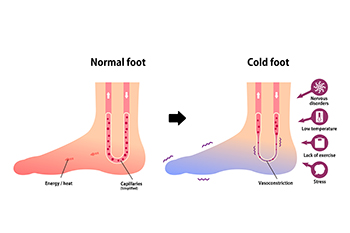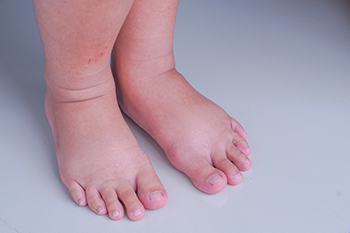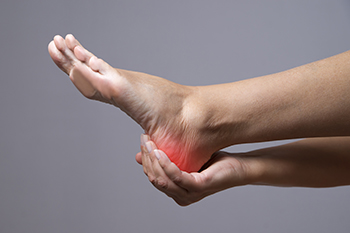Wesley Chapel
(813) 973-3535Call or Text
February 2023
Stiffness in the Ankle After Running

Many runners experience stiffness in their ankles after running. This is a common side effect of the amount of force that passes through the ankle during a run. It can affect the range of motion and mobility of the ankle. In some cases, it may become difficult to bear weight and lead to limping. Studies have indicated that the faster you run, the more likely you are to develop ankle stiffness. Further, the way you run may affect the ankle as well. For example, a heel-first footstrike is more likely to contribute to ankle stiffness than a toe-first style of running. Other possible causes of ankle stiffness include a sprain, arthritis, or plantar fasciitis. Lastly, check the wear and tear on your running shoes. It may be time to replace them, which is recommended by running experts between 350 and 500 miles. Shoes that lack ample support may contribute to ankle stiffness after running. For an examination and diagnosis to determine the cause of your ankle stiffness, it is suggested that you consult a podiatrist before it gets worse.
Ankle pain can be caused by a number of problems and may be potentially serious. If you have ankle pain, consult with one of our podiatrists from New Tampa Foot & Ankle. Our doctors will assess your condition and provide you with quality foot and ankle treatment.
Ankle pain is any condition that causes pain in the ankle. Due to the fact that the ankle consists of tendons, muscles, bones, and ligaments, ankle pain can come from a number of different conditions.
Causes
The most common causes of ankle pain include:
- Types of arthritis (rheumatoid, osteoarthritis, and gout)
- Ankle sprains
- Broken ankles
- Achilles tendinitis
- Achilles tendon rupture
- Stress fractures
- Bursitis
- Tarsal tunnel syndrome
- Plantar fasciitis
Symptoms
Symptoms of ankle injury vary based upon the condition. Pain may include general pain and discomfort, swelling, aching, redness, bruising, burning or stabbing sensations, and/or loss of sensation.
Diagnosis
Due to the wide variety of potential causes of ankle pain, podiatrists will utilize a number of different methods to properly diagnose ankle pain. This can include asking for personal and family medical histories and of any recent injuries. Further diagnosis may include sensation tests, a physical examination, and potentially x-rays or other imaging tests.
Treatment
Just as the range of causes varies widely, so do treatments. Some more common treatments are rest, ice packs, keeping pressure off the foot, orthotics and braces, medication for inflammation and pain, and surgery.
If you have any questions, please feel free to contact our office located in Wesley Chapel, FL . We offer the newest diagnostic and treatment technologies for all your foot care needs.
Why Live with Pain and Numbness in Your Feet?
Symptoms of Peripheral Artery Disease

There is a condition known as peripheral artery disease, which is abbreviated as PAD. This produces decreased blood flow in the feet and legs, possibly causing injuries to the nerves and tissues. PAD can happen due to a plaque build-up in the arteries, causing them to become narrow. This can affect the blood flow to the legs since there is limited blood flow and oxygen supply. There are existing medical conditions that may lead to PAD, including kidney disease, high blood pressure, and diabetes. The symptoms that are often associated with PAD can consist of foot pain, a numbing sensation, and sores that are slow in healing. Peripheral artery disease may be controlled by eating properly, resting, and taking proper care of the feet. Additionally, it is beneficial to stop smoking, if it applies, and it is helpful to monitor blood sugar levels. Uncomfortable foot conditions from PAD are treated by a podiatrist, and it is advised that you contact this type of doctor who can provide you with the correct treatment methods.
Peripheral artery disease can pose a serious risk to your health. It can increase the risk of stroke and heart attack. If you have symptoms of peripheral artery disease, consult with one of our podiatrists from New Tampa Foot & Ankle. Our doctors will assess your condition and provide you with quality foot and ankle treatment.
Peripheral artery disease (PAD) is when arteries are constricted due to plaque (fatty deposits) build-up. This results in less blood flow to the legs and other extremities. The main cause of PAD is atherosclerosis, in which plaque builds up in the arteries.
Symptoms
Symptoms of PAD include:
- Claudication (leg pain from walking)
- Numbness in legs
- Decrease in growth of leg hair and toenails
- Paleness of the skin
- Erectile dysfunction
- Sores and wounds on legs and feet that won’t heal
- Coldness in one leg
It is important to note that a majority of individuals never show any symptoms of PAD.
Diagnosis
While PAD occurs in the legs and arteries, Podiatrists can diagnose PAD. Podiatrists utilize a test called an ankle-brachial index (ABI). An ABI test compares blood pressure in your arm to you ankle to see if any abnormality occurs. Ultrasound and imaging devices may also be used.
Treatment
Fortunately, lifestyle changes such as maintaining a healthy diet, exercising, managing cholesterol and blood sugar levels, and quitting smoking, can all treat PAD. Medications that prevent clots from occurring can be prescribed. Finally, in some cases, surgery may be recommended.
If you have any questions, please feel free to contact our office located in Wesley Chapel, FL . We offer the newest diagnostic and treatment technologies for all your foot care needs.
A Serious Case of Swollen Feet

The body can provide hints to alert people that something potentially serious is going on in their bodies. Such signals take on different forms depending on the health issue experienced. Swelling of the feet is one such symptom that can be a flag of health problems. Peripheral edema, the term used to refer to swollen feet, is a gathering of fluid within the tissue of the feet. Swollen feet can be caused by prolonged periods of inactivity, walking for a long time, or hot, humid weather. They also can be caused by more serious underlying health conditions. Foot injuries, such as sprains and fractures often cause swelling. Lymphedema, when the lymphatic system is compromised and there is inefficient draining of fluid that collects in the lower limbs, can cause swelling in the feet. Osteoarthritis is a degenerative joint disease caused by wear and tear on joints and the breakdown of cartilage that can lead to the feet becoming swollen. Besides the fact that our feet are the source of our mobility, other health issues may be lurking behind swollen feet so taking care of them is critical. If you are experiencing prolonged swelling in your feet, it is suggested you see a podiatrist for a proper diagnosis and treatment.
Swollen feet can be a sign of an underlying condition. If you have any concerns, contact one of our podiatrists of New Tampa Foot & Ankle. Our doctors can provide the care you need to keep you pain-free and on your feet.
Swollen feet are a common ailment among pregnant women and people who stand or sit for extended periods. Aging may increase the possibility of swollen feet and patients who are obese often notice when their feet are swelling too. There may be medical reasons why swollen feet occur:
- Phlebitis - A condition that causes the veins to become inflamed and can also cause leg pain.
- Liver disease - This may lead to low blood levels of albumin which is a protein. This can cause fluid in the blood to pass into the tissues and several areas of the body can become swollen.
- Heart failure - When the heart doesn’t pump properly the blood that is normally pumped back to the heart can pool in the veins of the legs causing swollen feet.
- Kidney disease - One of the main functions of the kidneys is releasing excess fluid in the body. This type of condition can make it difficult for the kidneys to function properly, and as a result the feet may become swollen.
- Deep-vein thrombosis (DVT)- This is a serious condition where blood clots form in the veins of the legs. They can block the return of blood from the legs to the heart which may cause the feet to swell. It is important to be treated by a podiatrist if this condition is present.
Swollen feet can also be caused by bone and tendon conditions, including fractures, arthritis, and tendinitis. Additionally, there may be skin and toenail conditions and an infection may cause the feet to swell. Patients who take medicine to treat high blood pressure may be prone to getting swollen feet.
Many patients elevate their feet to help relieve the swelling and this is generally a temporary remedy. When a podiatrist is consulted the reason behind the swelling can be uncovered and subsequently treated.
If you have any questions please feel free to contact our office located in Wesley Chapel, FL . We offer the newest diagnostic tools and technology to treat your foot and ankle needs.
Plantar Warts Can Be Treated!
Down at the Heels

Heel pain can happen for a variety of reasons. While it can be caused by a systemic illness, such as gout or rheumatoid arthritis, it often develops from overuse. Common causes of heel pain include plantar fasciitis, heel spurs, and Achilles tendonitis. Plantar fasciitis is an inflammation of the plantar fascia, the band of tissue that runs from the heel to the toes on the sole of the foot. This can happen when the plantar fascia is overloaded or overstretched and small tears may develop. A heel spur is an abnormal bony growth at the junction of the plantar fascia and heel bone. A spur can come from strain on the plantar fascia and muscles of the foot. Achilles tendonitis is an inflammation of the Achilles tendon. It is triggered by overuse, particularly excessive jumping in sports. With all these conditions, ill fitting or worn out shoes can aggravate the problem. If you have heel pain that does not respond to rest, shoes that fit well, and are appropriate for your activity, please see a podiatrist who can properly diagnose the problem and provide treatment.
Many people suffer from bouts of heel pain. For more information, contact one of our podiatrists of New Tampa Foot & Ankle. Our doctors can provide the care you need to keep you pain-free and on your feet.
Causes of Heel Pain
Heel pain is often associated with plantar fasciitis. The plantar fascia is a band of tissues that extends along the bottom of the foot. A rip or tear in this ligament can cause inflammation of the tissue.
Achilles tendonitis is another cause of heel pain. Inflammation of the Achilles tendon will cause pain from fractures and muscle tearing. Lack of flexibility is also another symptom.
Heel spurs are another cause of pain. When the tissues of the plantar fascia undergo a great deal of stress, it can lead to ligament separation from the heel bone, causing heel spurs.
Why Might Heel Pain Occur?
- Wearing ill-fitting shoes
- Wearing non-supportive shoes
- Weight change
- Excessive running
Treatments
Heel pain should be treated as soon as possible for immediate results. Keeping your feet in a stress-free environment will help. If you suffer from Achilles tendonitis or plantar fasciitis, applying ice will reduce the swelling. Stretching before an exercise like running will help the muscles. Using all these tips will help make heel pain a condition of the past.
If you have any questions please contact our office located in Wesley Chapel, FL . We offer the newest diagnostic and treatment technologies for all your foot and ankle needs.













